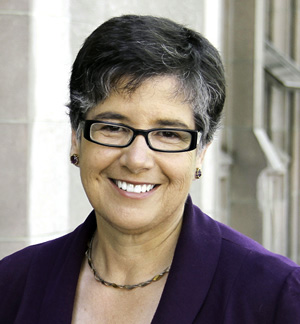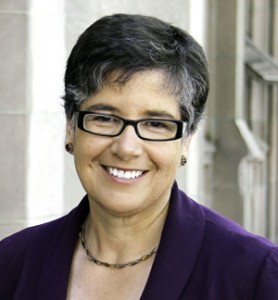

On her second official day in office as the interim president of the University of Washington in Seattle, Ana Mari Cauce spoke with The Miami Hurricane to discuss her new role as president and her memories of the University of Miami, which she attended for her undergraduate education.
Cauce was named interim president on Feb. 12, after former president Michael K. Young left for Texas A&M University. She began her term on March 2 and was previously the provost and executive vice president.
Cauce also talked about her family’s arrival in the U.S. early in the Cuban exodus, how she discovered her passion at UM and President Donna E. Shalala’s retirement.
TMH: How did growing up in Miami shape you?
Ana Mari Cauce: Well, I came here early in the wave of Cuban immigration to the U.S. after the revolution, and I was 3 at the time, in 1959. I remember in kindergarten, I did a lot of translating for the teacher because there were new Cuban kids and parents coming in. … I lived in a Miami that was changing. In the first 20 years that I lived there, the demographics changed fairly substantially…at first in elementary school, I was probably one of a few Cubans, and by the time I graduated Catholic school, probably half of the school was Cuban.
I started at UM in the honors program. … I started as an English and journalism major. … I like learning about people and talking to people, but I also realized as I progressed in the degree that it became less about reading stories and more about literary criticism, and I liked that less.
So, I took my first psychology course. I barely knew what it was. I ended up really being fascinated by it and took a work study course with the professor who taught my class, and that’s how I came to realize that that was the direction I wanted to go in. I feel very lucky that I was able to find my passion and something that suited me both as a person and suited the kinds of interested I have: trying to figure people out and working one-on-one with people, making a difference and research.
I really did experience the campus life and some of the things I remember was going to my first foreign film ever. … In lots of ways, I feel like it was in college and at the University of Miami that I really kind of woke up intellectually. Obviously in high school I read books that stretched me, but being in an environment where people think about how the world works and what’s my place in it, I really think my intellect was awoken in my UM days.
TMH: How do you think your time at UM shaped you as an academic administrator?
AMC: I’ve done a lot of work on what we call the Husky Student Experience, but it’s the student experience. I spend a lot of time working with students and faculty thinking about how we can make it a degree and more. For me, some of my most significant educational experiences at the university came outside the classroom, doing sponsored research with Professor Jacobsen. I did a senior thesis and wrote my first publication as an undergraduate, which is what got me into Yale. I had great grades, but I really spent a lot of time and put a lot of effort into thinking about what are the outside the classroom experiences that we want out students to have.
The other thing is that I still teach, and I make sure to teach an undergraduate course at least every other year. It’s just really important for me to stay in touch with the student experience and the student voice because that is a huge part of your mission. … It’s very easy as an administrator to get caught up in 10,000 other things that are very important, so you really have to make sure that you keep that in your schedule because it’s very important to me. I certainly had strong opinions when I was a student and it’s important to still listen to those.
TMH: Do you still come back to Miami? Do you have family here still?
AMC: I still have a bunch of nieces and nephews and so I’m back every other year.
TMH: Do you still stop by UM when you’re back?
AMC: I like the whole neighborhood so I often stop in, the last time I was there was about three years ago. Five years ago, I did a review for the psychology department there, and I’m also part of the National Hispanic Science Network, and the director of that network used to be at UM so we’d have meetings there. It’s pretty amazing just how much that campus has grown up. I can still get in my car and get around, but its amazing to me how many new buildings are on campus.
TMH: Yeah, they’re building a new outpatient health facility now too; it’s really transforming a lot.
AMC: Yeah that’s very obvious both in terms of the campus, but some of the parts of Miami (the beautiful beaches and the Everglades) haven’t changed, and they’re such beautiful part of the nature.
TMH: Are you still in touch with anyone from your UM days?
AMC: I’m not in touch with any of my professors, but I definitely am still in touch with some friends that I went to school and am still friends with on Facebook; I don’t see them that often, but we still communicate. Recently, a friend of mine whose son now goes to UM was telling me about his experience there and if he’s a good indication of what graduates are like, things are going well there.
TMH: UM President Donna Shalala is retiring. Have you had the chance to connect with her before?
AMC: Yes, me and President Shalala have been on a couple of panels together. There was a National Academy of Sciences Panel on Children and Families, and we met at that panel. She had actually accepted the job at UM but not started yet, and we had a good conversation about the social aspects of life in Miami.
And then later on she and I were both on another National Academy of Sciences Panel on women in science, and so we saw each other for a few meetings. She and I are actually working on editing a book on administration and higher education together. I think the world of her. The work that she has done, almost anyone would tell you that, the work she has done as President of UM to help transform that place is really special.
TMH: The university has certainly risen in rankings under her.
AMC: Yeah, and some of what I’ve learned watching her is that she’s someone who can go about the business of the university, because there is a business aspect to it, while at the same time remaining accessible to students and aware of their issues. I admire her a great deal for that and want to emulate that in my own life.





